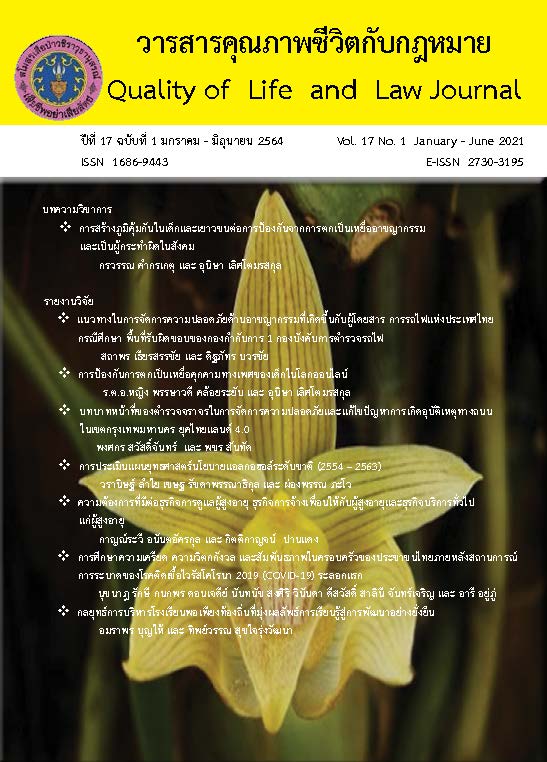Management strategies for local sufficiency school focusing on learning outcomes towards sustainable development
Main Article Content
Abstract
The purposes of this research were to: 1) to study the current and desirable conditions of the local self-sufficient school administration aiming at learning outcomes towards sustainable development; 2) to analyze the strengths, Weaknesses, opportunities and threats of the administration. 3) To develop and assess strategies for managing local sufficiency schools that focus on learning outcomes of sustainable development. Using a mixed research method of qualitative research and quantitative research. The sample consisted of 92 school administrators and 313 teachers, 12 key informants, 20 experts in the assessment of Strategic Draft No .1 and No., 11 people. Average Standard Deviation, Priority Needs Index, and Content Analysis.
The results of this research were 1) the present condition consisted of the internal environment and external factors as a whole, at a high level. Desirable conditions include the internal environment. And external factors as a whole were at the highest level. 2). Strengths consisted of the aspect of student development activities. In terms of personal development of educational institutions, the weak points consisted of educational institution management. In terms of curriculum and learning activities, opportunities consisted of social factors. And threats, consisting of political factors and government policies, economic aspects and technology; 3) the overall assessment of the Strategic Plan No.1 and No.2 is correct, appropriate, feasible. And usefulness at the highest level and management strategies for local sufficiency schools, consisting of four main strategies, eight secondary strategies, and 19 operational methods.
Article Details
- บทความหรือข้อคิดเห็นใดๆ ในวารสารคุณภาพชีวิตกับกฎหมายเป็
- กองบรรณาธิการไม่สงวนสิทธิ์
References
กรมส่งเสริมการปกครองท้องถิ่น. (2559). โรงเรียนพอเพียงท้องถิ่น. กรุงเทพมหานคร: กรมส่งเสริมการปกครองท้องถิ่น.
ดิถี เหมือนแม้น. (2561). การประเมินโครงการตามรอยพ่อความพอเพียงของโรงเรียนเทศบาล 4 หนองแค อนุสรณ์. สระบุรี: โรงเรียนเทศบาล 4 หนองแคอนุสรณ์.
ปัณฑารีย์ ฟองแพร่. (2559). ปัจจัยที่มีผลต่อการพัฒนาองค์กรให้มีศักยภาพการทำงานสูง: กรณีศึกษษ ธนาคารยูโอบี. วิทยานิพนธ์ปริญญาหลักสูตรบริหารธุรกิจมหาบัณฑิต สาขาวิชาการจัดการธุรกิจโลก วิทยาลัย พาณิชยศาสตร์. ชลบุรี: มหาวิทยาลัยบูรพา.
พฤทธิ์ ศิริบรรณพิทักษ์. (2553). การจัดการศึกษาเพื่อการพัฒนาที่ยั่งยืน: พื้นฐานการศึกษาด้านเศรษฐกิจ สังคมและสิ่งแวดล้อม. กรุงเทพมหานคร: โรงพิมพ์ไทยสัมพันธ์.
มหาวิทยาลัยสุโขทัยธรรมาธิราช. (2557). ส่วนประกอบของการพัฒนาที่ยั่งยืน. ค้นวันที่ 31 มกราคม 2560 จาก http://www.stou.ac.th
เรวัตร์ ชาตรีวิศิษฏ์และคณะ. (2554). การจัดการเชิงกลยุทธ์. (พิมพ์ครั้งที่ 2). กรุงเทพมหานคร: อินเฮาส์ โนว์เลจ, อักษรเงินดี.
สำนักงานเลขาธิการสภาการศึกษา กระทรวงศึกษาธิการ. (2561). รายงานวิจัยข้อเสนอตัวชี้วัดการศึกษา เพื่อความเป็นพลเมืองโลกตามกรอบเป้าหมายการพัฒนาที่ยั่งยืน. พิมพ์ครั้งที่ 1. กรุงเทพมหานคร: บริษัทพริกหวานกราฟฟิค จำกัด.
สุพรรณี อัครเดชเรืองศร. (2559). กลยุทธ์การบริหารโรงเรียนสิ่งแวดล้อมศึกษา. วิทยานิพนธ์ปริญญาดุษฎี บัณฑิต สาขาวิชาอุดมศึกษา คณะครุศาสตร์. กรุงเทพมหานคร: จุฬาลงกรณ์มหาวิทยาลัย.
อรุณ เรือนเพ็ชร. (2560). การประเมินโครงการส่งเสริมการเรียนรู้ตามแนวปรัชญาของเศรษฐกิจพอเพียง โรงเรียนเทศบาลทุ่งหลวง 1 (บ้านโคกมะพร้าว). สุราษฎร์ธานี: โรงเรียนเทศบาลทุ่งหลวง 1 (บ้านโคก มะพร้าว).
Brundtland, G. H. (1987). Our Common Future: World Commission on Environment and Development. Oxford: Oxford University Press.
Fred, R. David and Forest, R. David . (2017). Strategic Management A Competitive Adventage Approach, Concepts and Cases. 16th ed. England: Pearson Education Limited.
Robbins, S. P. and Coulter, M. (2018). Management. 14th ed. United States of America: Pearson Education, Inc.
UNESCO. (2014). Issues and Trends in Education for Sustainable Development บทที่ 1 จาก วาระที่ 21 สู่เป้าประสงค์ที่ 4.7: การศึกษาเพื่อการพัฒนาที่ยั่งยืน. แปลโดยสำนักความสัมพันธ์ ต่างประเทศ สำนักงานปลัดกระทรวงศึกษาธิการ, 2557. ค้นวันที่ 31 มกราคม 2560 จาก http://www.bic.moe.go.th
UNESCO. (2017). บทที่ 1 เรื่อง Education transforms Lives. แปลโดยสำนักความสัมพันธ์ต่างประเทศ สำนักงานปลัดกระทรวงศึกษาธิการ, 2561. ค้นวันที่ 19 กันยายน 2561 จาก http://www.bic.moe.go.th


